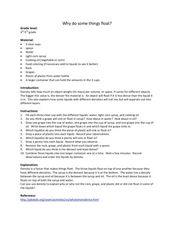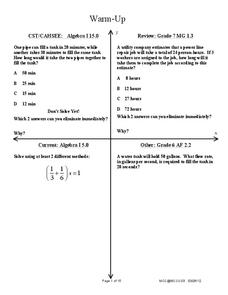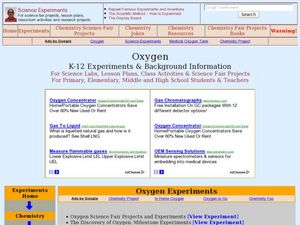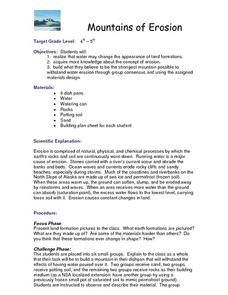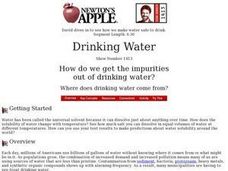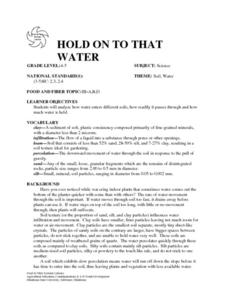Outdoor Learning Center
Outdoor Survival
Which of the following can you survive without for the longest time: water, food, or a positive mental attitude? The answer may surprise you. Guide learners of all ages through games, activities, and discussions about surviving in the...
Curated OER
Why Do Some Things Float?
Students recognize that density determines whether objects sink or float. In this sink or float lesson, students experiment with plastic in three liquids. students drop their objects into the liquids and observe and record their results.
Peace Corps
Culture is Like an Iceberg
What influences the way you dress, or celebrate holidays, or connect with your friends? Explore the cultural traits that are not easily seen with an engaging discussion. Using the model of an iceberg, learners place features of culture...
Utah Education Network (UEN)
Self-Concept: Self-Esteem
Most teenagers struggle with self-image and self-esteem. Guide them through these stormy waters with a series of activities focused on positive messages, true friendship and support, and self-concept.
DiscoverE
Shaky Ground
You're on solid ground if you decide to use the resource. A simple activity has young engineers investigate the problem of liquefaction. A battery placed on dry sand will stay standing—but not if scholars add water to the cup.
West Contra Costa Unified School District
Work Problems – Bar Models
Why do we have to do so much work? Scholars learn how to set up bar models to represent a situation involving work. They use these bar models to help set up equations with rational coefficients to solve the problem situation.
Curated OER
Precious Water: Is it a Need, a Right, or a Commodity?
Young scholars determine whether water is a need, a right, or a commodity. In this water lesson, students investigate land and water ecosystems through activities. Young scholars also discover water as a resource and energy source as...
Curated OER
Water And EcoFluxx
Students investigate the environmental concepts covered while playing the game of Eco Fluxx. They focus upon the supply of water found in aquifers and define how they are connected to the environment. Students discuss the playing of the...
SF Environment
Pre-School Composting and Recycling!
You can never be too young to get involved in composting or recycling. Here is a lesson that has been made for the very littlest learners and it's all about the importance of conservation. They'll sort compostable and recyclable objects,...
Curated OER
More on Conduction and Convection
Why do some items feel colder when they are the same temperature? How should you keep your soda cold? What makes the wind blow? These are just some of the things middle schoolers discover when completing a lesson on conduction and...
Curated OER
It's Mine Lesson Plan
Students read a book called It's Mine! In this lesson about three frogs and sharing, students explore how what they do affects everything around them. Through a series of seven different activities, students interpret the frogs and their...
Curated OER
H2O2 Decomposition Lab II
Students conduct an oxidation experiment in which they must determine how much hydrogen peroxide (H2O2) is actually in a store-bought solution of H2O2.
Curated OER
The Magic School Bus Wet All Over Clean-up!
Pupils investigate the water cycle using activities from The Magic School Bus series. They determine what happens when water is heated and cooled by observing two different experimental set-ups.
Curated OER
Creek Monitoring
Sixth graders conduct a variety of assessments at a local stream to determine if it is a suitable habitat for salmon. They measure temperature, tubidity, dissolved oxygen, pH levels, bacteria and nutrients. In this unit, 6th graders work...
Curated OER
Oxygen
Students explore oxygen and its physical and chemical propeties. In this investigative lesson students complete several experiments using oxygen.
Curated OER
Mountains of Erosion
Students study the change in land formations due to water erosion. They work in groups to build a model of a mountain that will be composed of materials that will best withstand water erosion.
Curated OER
Big on Blubber: How do Whales Stay Warm?
Students explore biology by conducting a science experiment in class. In this whale anatomy lesson, students identify the use of whale blubber for the animal to stay warm in cold waters while utilizing ice, vegetable oil, plastic bags...
Curated OER
Still Waters
Pupils construct a still to turn seawater into drinking water. They estimate the cost of distilling it. They investigate ways to make the conversion more efficient. They track the source of their home drinking water and make a map of its...
Curated OER
Alka-Seltzer Cannons
Fourth graders observe what is happening when an Alka-Seltzer tablet is placed in a clear cup of water. They observe the release of carbon dioxide gas. Pupils answer the question of how much as is released by observing the experiment...
Curated OER
Modeling an Oil Reserve
Students conduct an experiment. In this oil and natural gas lesson, students learn how geoscientists identify and explore reserves of petroleum. Students make a model of an oil reserve, record how much it would cost to drill for oil...
Curated OER
Science-Observation Skill Builders
Pupils explore observation while making connections between observation skills and careers (like how farmers observe the weather). They view a variety of nature photographs on the computer and practice their observation skills by...
Curated OER
Wacky Water Critters
Young scholars visit a local creek or stream. They collect water samples from the creek and observe and sort the "water critters" they find in the sample, observing smaller organisms under a microscope if necessary. They identify each...
Curated OER
HOLD ON TO THAT
Students will analyze how water enters different soils, how readily it passes through and how much water is held.1. Materials needed for the activity are; pint of clay, pint of sand, pint of loam, newspaper,
three frozen fruit juice...
Nuffield Foundation
No Stomach for It: Investigating Antacid Medication
You won't get a stomachache doing an investigative experiment. Pupils simulate the effect of antacids on stomach acid. Obviously, they won't be using real stomach acid; diluted hydrochloric acid serves this purpose.



